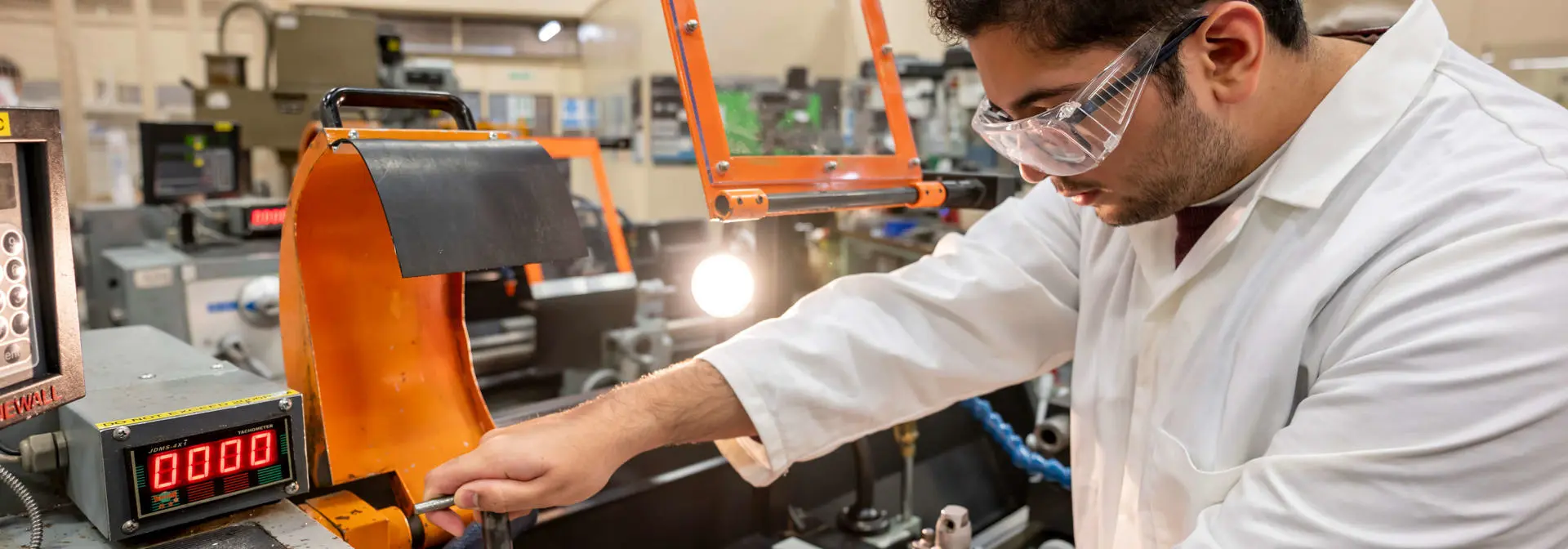Key information
- Level
- Postgraduate Taught
- Delivery type
- Full Time
- Degree qualification
- MSc
- Mode of delivery
- On-Campus
- Duration
- 2 years
- Location
- Edinburgh
- Start date
- September
MSc Advanced Mechanical Engineering with Industrial Application is a two-year degree which offers you the opportunity to learn advanced design and research in mechanical engineering, and then practically apply this knowledge in your industry placement or project. The programme allows those with a bachelor-levels graduate in Mechanical Engineering to build upon your existing knowledge and skills in the area. For those from a different Engineering background, the programme offers you the opportunity to develop key Mechanical Engineering knowledge and skills required for your professional development. You’ll gain a deep understanding of the core engineering and science underpinning the Mechanical Engineering and Manufacturing sector. The industry-relevant degree will provide you with an accredited route to become a Chartered Engineer.
During the master’s programme, you’ll gain a broad knowledge of the core components in Mechanical Engineering Sciences and practices, whilst developing an extensive, detailed, and critical knowledge and understanding of at least one specialist area within the subject. The flexible degree structure allows you to focus in on your specific interests within Advanced Mechanical Engineering. You’ll have the opportunity to choose courses from an extensive list, including fluids, dynamics, renewable energy technologies, heat exchangers and heat transfer, robotic mechanical systems, and advanced thermodynamic applications.
In your second year, you will spend your first semester working on your dissertation before reflecting upon your teaching and applying your knowledge and skills to an industrial setting through a placement, or to an interdisciplinary project. This gives you the opportunity to develop your industrial skills and experience within a real-life work environment, whilst gaining some globally recognised and verifiable work experience in the British engineering sector.
The career-focused master’s programme will develop your technical, scientific, and managerial abilities, and provide you with a specialist education to set you up to become a professional Mechanical Engineer. Upon completion, you’ll have the skills and knowledge to prepare you for a wide range of technical and managerial careers across the sector, including roles in process and plant design, construction, commissioning, operation, management to specialist consultancy, and advanced research and development.
Your student experience
Your learning will be informed by the expertise of our research-active mechanical engineers and academics.
96% of Heriot-Watt University’s engineering research was classed as world-leading in the REF 2021 review, which ranked us 1st in Scotland and 3rd in the UK for engineering research through a joint submission with the University of Edinburgh.
We were recently ranked 1st in Scotland for Mechanical Engineering in the Guardian University Guide 2026. Heriot-Watt University also achieved 2nd in Scotland for Mechanical Engineering in the Times and The Sunday Times Good University Guide 2026, reflecting the exceptional quality of our teaching, research, and industry engagement in the field.
Our MSc Advanced Mechanical Engineering is directly informed by the world class research carried out by Heriot-Watt’s Mechanical, Process and Energy Engineering (IMPEE) research institute which focuses on promoting excellence across four main research themes:
- Biomedical Engineering
- Digital Engineering
- Energy Harvesting and Conversion
- Multiphase Flow
The research relevance of this postgraduate programme ensures your studies remain innovative and industry focused.
Go Global
There are currently no Go Global opportunities for this particular programme. However, other Go Global opportunities may be available. Please contact studywithus@hw.ac.uk for more information.
Course content
September Intake - Edinburgh
Year 1
Mandatory September
- Computational Fluid Dynamics with Heat Transfer
- Professional and Industrial Studies
Optional September
- Incompressible Fluid Dynamics
- Advanced Mechanics of Materials 1
- Dynamics 1
- Heat Exchangers and Heat Transfer
- Renewable Energy Technologies
Mandatory January
- Failure and Accident Analysis
- Critical Analysis and Research Preparation
Optional January
- Compressible Fluid Dynamics
- Advanced Mechanics of Materials 2
- Dynamics 2
- Robotic Mechanical Systems
- Specialist Engineering Technology 2
- Advanced Thermodynamic Applications
Year 2
Mandatory September
- Entrepreneurship & Creativity
Mandatory January
- Masters Dissertation
Mandatory AY
- Industrial Placement for Engineering and Physical Sciences
Disclaimer
The courses mentioned above may change between now and the time that you study. For more information, please view our Terms and Conditions.
Programme Video
The Heriot-Watt experience
Student testimonials

Siddheshwar's story
Graduate, Civil Engineering with Industry Placement (2 years) MSc
I've really enjoyed my programme at Heriot-Watt. The quality of teaching is extremely high and the cross-culture experience is really unique. I love the fact that the University is established, with great history, and the campus is stunning – it's so green and spacious.
Fees and funding
| Status | Full Time |
|---|---|
| UK | £12,744 |
| International | £28,952 |
- Status: Your residency status is usually defined as the country where you have been ordinarily resident for the three years before the start of your course.
- International: 'International' includes applicants from European Union countries who do not hold Pre-Settled or Settled status in UK. (This does not include students from the Republic of Ireland - see above).
Additional information
Fees are payable for each year of this degree.
Year 2 (Industry placement)
| Status | Full Time |
|---|---|
| UK and International | £3,000 |
Scholarships and bursaries
Postgraduate scholarships and bursaries
We aim to encourage well-qualified, ambitious students to study with us and we offer a wide variety of scholarships and bursaries to achieve this. Over £6 million worth of opportunities are available in fee and stipend scholarships, and more than 400 students benefit from this support.
Entry requirements
We have standard entry requirements for all of our courses that you will have to meet.
Year 1
A minimum of honours degree at 2:1 or non-UK equivalent in a relevant subject. Degree must contain a minimum of both 3 mathematics modules and 3 physics or engineering modules at 50% or above. Relevant degrees can include Mechanical Engineering, Aeronautical Engineering, Materials Engineering, Biomedical Engineering, Automotive Engineering and Physics.
Modules that we hope to see in an undergraduate degree would include materials, fluid dynamics, thermodynamics, dynamics and structures, whereas unsuitable degrees for entry would have substantial focus on manufacturing.
Work experience in conjunction with a relevant lower Second Class Honours Degree will be considered.
We welcome applications from international students and accept qualifications from around the world. Please refer to the entry requirements for your country for more details.
English language requirements
If your first language is not English, we'll need to see evidence of your English language ability.
The minimum English language requirement for entry to this programme is IELTS 6.0 (or equivalent) with no score lower than 5.5.
If you do not have IELTS 6.0, we offer a range of English language courses to help you meet the English language requirement for this programme prior to commencing your studies.
Please see our detailed English language requirements.
Why Heriot-Watt
We're the top university in Scotland for graduate outcomes which means that more of our graduates are employed or in postgraduate education than any other institution in the country and we ranked 5th in the UK.
We're also rated number one in the UK for CEO or MD roles, meaning more of our graduates go on to become CEOs or MDs than any other university in the whole of the UK. On top of that, we have beautiful campuses, across the globe, so you'll get a truly international education. Our Edinburgh Campus is home to Oriam, Scotland's National Sports Performance Centre combined with plenty of wellbeing resources, prioritising fitness and mental health for all students. Our Global Research Institutes look at solving real world issues such as climate change and saving our oceans as well as working on the next medical technological breakthrough and the future of AI and robots.
Student life
Explore facilities, and chat to staff and students





